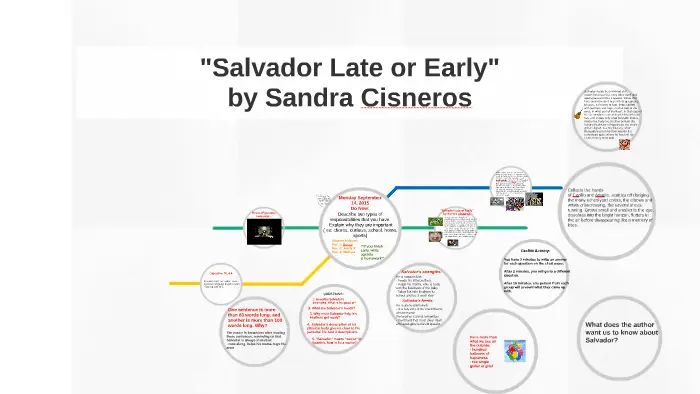In American literature, Sandra Cisneros has a remarkable name for her special style and exceptional use of literary devices. She grew up in Chicago and being Mexican-American, her background shines through in her writing, which makes it real and full of feelings.
She’s best known for short stories and one of her stories is “Salvador Late or Early,” which is a touching tale about childhood, duty, and finding yourself. In this article, we’ll review this amazing story, its ideas, writing tricks, and why it’s so powerful.

Salvador Late or Early Early Theme
Salvador Late or Early by Sandra Cisneros tells the story of a young boy named Salvador, which gives us a peek into his daily struggles and the tough situations he faces. It’s a touching tale that makes you think about life and the ongoing struggles. These are the themes of this most trending poem:
Family
The story revolves around family, where Salvador steps up to take care of his younger brothers while his mom looks after the youngest one. Even though it’s hard, Salvador stays devoted to his family, which shows us how caring he is.
Childhood
The story really captures what it’s like to be a kid. We see Salvador’s innocence and how lonely he feels without friends. Even his teacher can’t remember his name, and I think this best highlights the isolation kids sometimes feel.
Self-Sacrifice
Salvador’s willingness to sacrifice his own wants and needs for his brothers is a big part of the story. He shows how responsible and mature he is for his age.
Resilience
Despite facing tough times, Salvador keeps going. He takes on big responsibilities and stays dedicated to his family, which is a mark of incredible strength and maturity.
Compassion
The story also touches on compassion. When we read lines like “What did he ever do to deserve a life like this?” it makes us think about how unfair Salvador’s situation is and how much he deserves better.
Salvador Late or Early Analysis
This story focuses on Salvador’s everyday life and the challenges he faces instead of focusing on a typical storyline. Below is a detailed analysis of the story:
Plot Summary
The story introduces us to Salvador, a boy with messy hair and teeth, who lives in a dull, poor neighborhood where the houses match the dreary sky. Salvador takes care of his younger brothers, wakes them up, makes breakfast, and gets them to school on time every day. He cleans up after them patiently, even picking up crayons dropped by his youngest brother.
Despite his efforts, Salvador goes unnoticed and has no friends. Even his teacher struggles to remember his name, highlighting how invisible he feels. The story ends with Salvador leading his brothers to school, which slowly disappears into the distance.
Character Analysis
Salvador is a complex character who carries adult responsibilities at a young age. His selflessness and quiet strength show how mature and devoted he is to his family. Regardless of his tough life, Salvador remains hopeful and cheerful, which shows resilience. His invisibility, even to his teacher, reflects the struggles of children who are overlooked due to their cultural backgrounds.
What we Analyse:
Salvador Late or Early gives us a glimpse into the life of a boy burdened with adult responsibilities. Through Salvador’s story, it explores themes of family, childhood, and sacrifice.
Don’t miss reading on the effects of Kinemaster, an editing app.

Salvador Late or Early PDF
This is the PDF of the story text, you can click it for a full view.
Salvador Late or Early Summary
Salvador Late or Early by Sandra Cisneros starts by describing Salvador, a boy with messy hair and teeth, living in a poor, dreary neighborhood where the houses match the cloudy sky. Even though he’s young, Salvador takes care of his younger brothers, Cecilio and Arturito, every morning.
Their mom is busy with the youngest sibling, so Salvador makes sure they wake up, eat breakfast, and get to school on time. He cleans up after them patiently, even picking up crayons dropped by Arturito. But in spite of his efforts, Salvador doesn’t have any friends. Even his teacher struggles to remember his name, which shows how invisible he feels.
Literary Devices Used in Salvador’s Late or Early
The use of literary devices clears the ambiguity developed in the writing also it takes up the plot which helps in building readers’ interest. To me, no one knows the better use of these devices but Sandra Cisneros. So, here I gathered the devices used in the story:
Imagery
Cisneros describes things so vividly that you can almost see them. She talks about Salvador as a boy with messy hair and teeth and describes houses that look like the color of gloomy weather.
Characterization
Instead of directly telling us about Salvador, the story shows us who he is through his actions. We see him waking up his brothers, helping them with their shoes, and making breakfast, which shows how responsible and grown-up he is.
Symbolism
The story uses symbols to mean more than just what they are. For example, Salvador’s scars and hurt show the tough times he’s been through.
Diction
The words Cisneros chooses help set the mood of the story. Words like “crooked,” “bad weather,” and “history of hurt” make you feel sad and sorry for Salvador.
Third-Person Narration
The story is told by someone who’s not in the story, which lets us see things from the outside and understand what’s going on with Salvador.
Emotive Language
Cisneros uses words that stir up strong feelings, like “history of hurt” and “geography of scars,” to make us really feel for Salvador.
FAQs
What was the conflict in Salvador Late or Early?
In the story, the main struggle is Salvador’s battle to understand himself while he’s busy helping others. He works hard but hardly gets any recognition, not even from his teacher, who sometimes forgets his name.
What does Salvador’s late or early mean?
The title “Salvador Late or Early” means how Salvador is always taking care of things, leaving him little time for a regular childhood. His name, “Salvador,” which means “savior” in Spanish, shows how important his role is in his family.
What is the tone of Salvador, late or early?
The tone of the story is sad yet understanding. It makes you feel sorry for Salvador, who appreciates his selflessness and strength despite the tough situations he faces.
Wrapping Up
Salvador Late or Early by Sandra Cisneros is an amazing narrative that explores themes of family, childhood, and self-sacrifice through the life of a young boy named Salvador. With its powerful descriptions, touching words, and strong characters, this story stands out as a meaningful piece of writing. It reminds us of how strong people can be, even when life gets tough.




